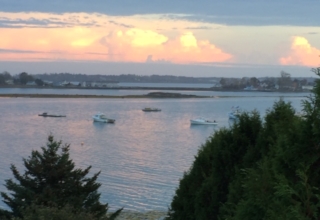
The “I-Thou” conception offered by Martin Buber provides us with guidance in this matter. According to Buber (a Jewish theologian), the “I-Thou” exists through God’s grace. Similarly, the Greek word “agape” refers not just to mankind’s relationship to some deity. It also relates to the ways in which we treat and care for other people on behalf of our religious beliefs. During the 21st Century, we need not focus on the relationship between humankind and a deity—we can focus instead on ways in which collaborative relationships are enhanced and sustained (“I-Thou”) when these relationships are based on a shared vision. We don’t need adrenaline. Rather, we need oxytocin which is produced to bind people together and bind people to a vision (as well as mission, values and purposes). This is the key to enactment of collective expertise as well as sustaining a vision. The expertise and vision must induce a sense of community and shared commitment; hence neither the expertise nor the vision can just be the product of one person’s advice or sense of the future.
If people are open to the sharing of expertise and are bound together, at least in part, through commitment to a shared, compelling vision of the future, then it becomes obvious that the two key roles to be played by the visionary leader are keeping the vision alive and preparing a new vision. This usually means not only that the leader periodically reminds his or her colleagues of the vision, but also that the leader facilitates a periodic review of and updating of the vision. The leader of vision is in trouble if the vision either is ignored or if the vision is reached. We continue to look for expert insights and advice from other people because there must always be a sense of something undone, of something yet to be done, of something worth doing.
Image of the Future: Many years ago, a noted European social historian, Fred Polak (1972), wrote about the decline of social systems that have lost their image of the future. Polak points to a critical factor in the ongoing existence of any social system (or any living system for that matter). It must have something toward which it is moving or toward which it is growing. Organisms are inherently “auto-telic”—meaning that they are self-purposed. They don’t need anything outside themselves to engage their world actively and in an inquisitive manner. This is the fundamental nature of play and curiosity that is to be found among all mammals.
Without a sense of direction and future possibilities we dry up and find no reason to face the continuing challenge of survival. We find little reason for producing and preparing a new generation. In the series of Australian movies regarding Mad Max a post-nuclear holocaust world is portrayed that is coming to an end. When no viable future is in sight, then (as we see in these movies) there is no attending to children. They must fend for themselves, for we know they have no personal futures. Ironically, there is a powerful story about post-nuclear holocaust in a novel by Cormac McCarthy (2006), called The Road, in which the father continues to protect and sacrifice for his son, even though the world is coming to an end. This extraordinary protagonist somehow finds meaning and purpose – and vision—regarding his son in the midst of despair and death. Perhaps this is the type of leadership that we need in the challenging world of 21st Century polarization, terrorism, nihilism and despair.
Download Article














